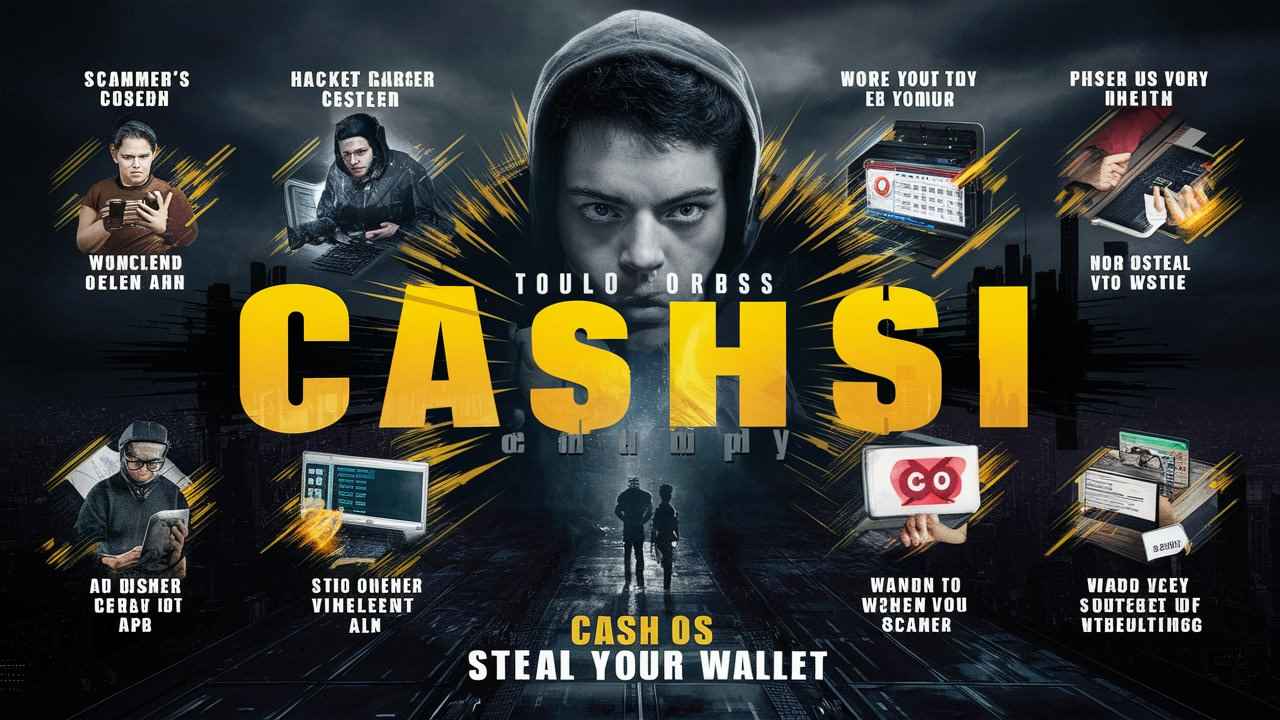The Digital Gold Rush Gone Wrong
In the world of finance, Cash App has emerged as a shining beacon of convenience, enticing users with its seamless transactions and friendly interface. With millions of users transferring money at lightning speed, it has become the go-to app for everything from splitting bills to investing in Bitcoin. However, like moths to a flame, scammers have flocked to this digital gold rush, ready to siphon off your hard-earned cash.

As the digital payment landscape evolves, so does the audacity of these fraudsters. From fake notifications to phony investment opportunities, the scams are as varied as they are insidious. It’s crucial to cultivate an awareness that keeps your wallet safe. After all, in a world where digital convenience reigns, being informed is your best defense against becoming the next victim.
What is Cash App? A Quick Dive into the Money Pool
Cash App, developed by Square Inc., is a mobile payment service that allows users to send and receive money easily. With an intuitive design and features tailored for everyday use, it has carved out a significant niche in the financial ecosystem.
Features that make Cash App user-friendly
Cash App boasts a plethora of features that cater to its user base. From instant money transfers to the ability to buy Bitcoin, it’s a veritable smorgasbord of financial tools. Users can create a unique $Cashtag for transactions, making sending money as easy as pie. Moreover, its integration with direct deposit allows for seamless paydays, while users can even order a Cash Card💳debit cards linked to their Cash App balance.
Common transactions: Sending, receiving, and investing
At its core, Cash App simplifies the art of financial transactions. Whether you’re splitting a dinner bill or lending money to a friend, it’s all just a few taps away. The app also introduces users to the world of investing, enabling them to purchase stocks with as little as $1, opening up the financial markets to the everyday person.
Why scammers are drawn to this platform
The app’s popularity and user-friendly interface make it a prime target for scammers. With millions of transactions occurring daily, fraudsters can blend into the digital noise, making it difficult for victims to spot deception until it’s too late. The relative anonymity that Cash App provides creates fertile ground for schemes that exploit unsuspecting users.

The Psychology of Scams: Why We Fall for Them
Scams are not merely about trickery; they exploit psychological vulnerabilities that lie deep within us.
Understanding the scammer’s mindset
Scammers are crafty con artists, adept at manipulating emotions and perceptions. They understand that their victims often seek quick solutions or instant gratification, creating an illusion that is hard to resist.
Common emotional triggers used in scams
Fear, urgency, and greed are the trifecta of emotions that scammers wield like weapons. A sudden notification claiming your account is at risk, for instance, can send anyone into a frenzy, prompting hasty decisions. Similarly, the allure of free money taps into our desire for easy gains, making us susceptible to their schemes.
The role of urgency and fear in making impulsive decisions
Scammers thrive on the psychology of urgency. The sense that time is running out can cloud judgment and lead individuals to overlook red flags. It’s crucial to take a step back and assess the situation rationally, even when emotions are running high.

Scams That’ll Steal Your Wallet: The Top Ten
Fake Payment Notifications: The “Too Good to Be True” Trap
How these notifications work
Picture this: your phone buzzes, and a notification appears, claiming that someone has sent you a generous amount of money. Instinctively, you feel a rush of excitement. But wait! This could be a ruse, one of the many fake payment notifications that scammers deploy to hook unsuspecting users.
Signs that a notification is fake
Look for telltale signs: misspellings, odd sender addresses, or unusual requests for personal information. A legitimate payment notification from Cash App won’t ask for sensitive data or urge you to act immediately.
What to do if you receive one
If you find yourself staring at a suspicious notification, don’t engage. Instead, verify the transaction by logging into your Cash App account directly (never through a link in the notification) and report any anomalies.

Phishing Scams: The Bait and Switch
Definition and how they operate
Phishing scams are like digital fishing expeditions, where scammers cast their lines through emails, texts, or social media messages, hoping to reel in unwitting victims. They often impersonate trusted entities, creating an air of legitimacy that makes their bait hard to resist.
Recognizing suspicious emails and texts
Be vigilant! Phishing attempts are often riddled with grammatical errors, generic greetings, and links that lead to fake websites. Always scrutinize the sender’s email address💳scammers often use addresses that resemble legitimate ones but contain subtle discrepancies.
Best practices for avoiding phishing attempts
The best defense against phishing is a keen eye. Avoid clicking on links from unknown sources, and never provide personal information in response to unsolicited messages. When in doubt, go directly to the source’s website to verify the communication.
Cash App Giveaway Scams: If It’s Free, It’s Probably Not
Overview of common giveaway scams
Who doesn’t love free stuff? Scammers exploit this universal desire through elaborate giveaway schemes, promising large sums of money or extravagant prizes in exchange for a small upfront fee or personal information.💳
The lure of free money: why it’s so tempting
The allure of “free money” can cloud judgment and lead even the most cautious individuals astray. Scammers create a sense of exclusivity, making you feel like you’re part of an elite group selected for the giveaway.
Steps to verify legitimate giveaways
Before diving headfirst into a giveaway, research the organization behind it. Look for official announcements and read reviews. If it seems too good to be true, it probably is.

Account Takeover Scams: When They Want Your Identity
How scammers gain access to your account
Account takeover scams are particularly insidious. Scammers often use phishing techniques to harvest personal information, such as passwords or PINs, allowing them to gain full access to your Cash App account.
Warning signs of an account takeover
Be on the lookout for unfamiliar transactions or changes to your account settings. If you receive notifications of logins from devices you don’t recognize, act immediately💳these are red flags signaling a potential takeover.
Steps to secure your account after an attack
If you suspect your account has been compromised, change your password immediately and enable two-factor authentication. Additionally, review your transaction history for any unauthorized charges and report them to Cash App.
Customer Support Impersonation: The “Help” That Hurts
How scammers pose as Cash App support
Scammers often masquerade as customer support representatives, preying on users’ fears and vulnerabilities. They may reach out through social media or phone calls, claiming to assist with issues you didn’t even know you had.💳
Common tactics they use to gain your trust
Scammers employ a variety of tactics to instill trust, such as using official-sounding language or providing seemingly helpful solutions. They may also create a sense of urgency, pushing you to act quickly without thinking.
Tips for verifying official support channels
Always verify the source before engaging with customer support. Visit Cash App’s official website for contact information, and remember that legitimate support will never ask for sensitive information like your password.

Fake Investment Opportunities: Don’t Get Caught in the Net
Overview of fraudulent investment schemes
The allure of quick riches often leads people down the treacherous path of fake investment schemes. Scammers pitch get-rich-quick ideas that promise unrealistic returns, often leveraging Cash App to facilitate transactions.💳
Signs of a scammy investment pitch
Be wary of high-pressure sales tactics, vague language, and overly complex explanations. If it sounds too good to be true💳well, you know the rest. Always conduct thorough research before investing your hard-earned money.
Legitimate investment advice vs. fraudulent claims
Real investment opportunities are backed by research and transparent information. Always scrutinize the claims and ensure the investment is legitimate by checking for registration with relevant financial authorities.
Impersonation Scams: “I’m Your Friend!” (But Not Really)
How scammers pose as friends or family
Impersonation scams thrive on social connections. Scammers may hack into someone’s account or create a fake profile, reaching out to friends and family with requests for money or sensitive information.
Warning signs to look out for
Watch for unusual requests, especially those asking for money in a hurry. If a friend typically communicates with you through a specific platform, be skeptical of sudden changes in their contact methods.
How to verify if a request is genuine
When in doubt, reach out to your friend through a separate communication channel. A quick phone call or text can save you from falling victim to an impersonation scam.
Cash Card Scams: The “New Card” Conundrum
What are Cash Cards and why they’re targeted
Cash Cards are a convenient tool linked to your Cash App balance, allowing users to make purchases anywhere Visa is accepted. However, their popularity makes them a prime target for scammers seeking to exploit unsuspecting users.💳
Recognizing fake card requests
Be cautious of unsolicited requests for your card information. Legitimate companies won’t ask for sensitive details via email or text. If something feels off, trust your instincts.
Protecting your card information
Always safeguard your Cash Card details and report any suspicious activity immediately. Regularly check your transaction history for unauthorized charges and update your PIN frequently.
Rental Scams: When Your Dream Home Turns into a Nightmare
Overview of rental scams on Cash App
Rental scams proliferate in the digital age, where scammers advertise fake properties to lure unsuspecting renters into sending money upfront. Often, they use platforms like Cash App for transactions to maintain anonymity.💳
Red flags to watch for in rental listings
Unusually low prices, vague descriptions, and requests for immediate payment are all telltale signs of a scam. If the landlord is unwilling to meet in person or provide references, tread carefully.
How to safely rent or buy online
Research the rental market in your area, and use reputable websites for listings. Always visit the property and meet the landlord before making any financial commitments.
Job Scams: “Congratulations, You’re Hired!” (Not So Fast!)
Common job scams that involve Cash App
Job scams have evolved into sophisticated schemes that often involve Cash App for payment. Scammers promise high salaries for minimal work, enticing individuals with the allure of easy money.
The lure of easy money for minimal work
The promise of lucrative pay for simple tasks can be intoxicating, but it often leads to disappointment. Scammers require upfront fees for training or materials, leaving victims with little to show for their investment.💳
Verifying legitimate job offers
Always research the company behind the job offer. Check for reviews and contact information, and never pay upfront fees for a position. Legitimate employers won’t ask for your money.
Protecting Yourself: Tips and Tricks to Stay Scam-Free
Best practices for using Cash App securely
To navigate the treacherous waters of digital payments, it’s essential to adhere to best practices. Always verify the recipient’s information before sending money, and utilize the app’s security features to safeguard your account.💳
Importance of two-factor authentication
Two-factor authentication adds an extra layer of security to your account, requiring a second form of verification before granting access. This simple step can thwart many attempts at unauthorized access.
Regular account monitoring: What to check
Make it a habit to monitor your account regularly. Check your transaction history for any anomalies, update your passwords frequently, and report any suspicious activity to Cash App immediately.
Reporting Scams: How to Fight Back
Steps to take if you’ve been scammed
If you find yourself a victim of a scam, act quickly. Document everything, including communications and transaction details, and report the incident to Cash App as well as your bank.
Reporting scams to Cash App and authorities
Cash App takes scams seriously. You can report fraudulent activities directly through the app, and contacting local authorities may also be necessary, especially for larger sums involved.💳
The importance of sharing your experience
Sharing your experience not only helps raise awareness but can also prevent others from falling victim to similar scams. Consider posting about your experience on social media or community forums to spread the word.
The Future of Digital Payments: Staying Ahead of Scammers
Trends in digital payment scams
As technology evolves, so do the tactics employed by scammers. New trends in digital payment scams are emerging, requiring users to remain vigilant and informed.💳
How technology is evolving to combat scams
Companies are investing in advanced security features to combat fraud. From AI algorithms detecting unusual transactions to enhanced user verification processes, the landscape is shifting in favor of security.
Staying informed and aware: Your best defense
Education is your most potent weapon against scams. Stay informed about the latest scams, attend webinars or workshops on digital safety, and foster a culture of awareness within your community.
Conclusion: Don’t Let Scammers Rain on Your Cash App Parade
In the fast-paced world of digital payments, knowledge is power. By arming yourself with information and employing best practices, you can navigate Cash App and other platforms with confidence.
Staying vigilant and informed not only protects your wallet but also fosters a safer digital environment for all users. Remember, your wallet deserves better💳don’t let scammers rain on your Cash App parade!
People Also Ask
How do Cash App scams work?
Cash App scams typically involve deceitful tactics designed to trick users into revealing personal information or sending money. Scammers often impersonate legitimate entities, such as companies or friends, and create a sense of urgency or fear. Common methods include fake payment notifications, phishing emails, and social media impersonations, all aimed at exploiting users’ trust.
Key tactics include:
- Phishing: Sending fraudulent messages that appear to be from Cash App, prompting users to click on malicious links.
- Impersonation: Posing as a friend or family member to request money urgently.
- Fake giveaways: Promising large sums of money in exchange for a small payment or personal information.
Is it safe to receive money on Cash App from strangers?
Receiving money from strangers on Cash App can be risky. While the app allows users to accept payments from anyone, transactions from unknown senders may be tied to scams. If a stranger sends you money, it’s essential to proceed with caution. Scammers often send money with the expectation of later reversing the transaction or using the payment to gain your trust.
Will Cash App refund money if scammed?
Cash App does not guarantee refunds for transactions deemed fraudulent or unauthorized. However, users can report suspicious activity and may be able to recover funds under certain circumstances. It’s crucial to act quickly, as reporting the scam immediately increases the chances of recovering your money.
Why would a scammer want to send me money?
Scammers may send money as part of a scheme to gain your trust or manipulate you into providing personal information. By initiating a transaction, they create an illusion of legitimacy, which can prompt victims to respond favorably to further requests for money or sensitive data.
Can a scammer get my info from Cash App?
Yes, scammers can potentially access your information if you inadvertently share it with them. This often occurs through phishing attempts where users unknowingly provide login credentials or personal details. Additionally, if your Cash App account is compromised, scammers may gain access to your transaction history and other sensitive data.
Is Cash App safe?
Cash App incorporates various security features, such as encryption and fraud detection, to protect user accounts. However, like any digital platform, its safety largely depends on user behavior. Employing best practices, such as enabling two-factor authentication and avoiding sharing sensitive information, can significantly enhance your security while using Cash App.
Can someone send you $5000 on Cash App?
Yes, Cash App allows users to send and receive up to $1,000 within any 30-day period without verifying their identity. However, once your identity is verified, you can send and receive up to $7,500 per week. Therefore, if someone is verified, they can indeed send you $5,000 on Cash App.
Do I have to pay a fee to receive $3000 on Cash App?
Receiving money through Cash App is generally free, but there are some caveats. If the payment is made using a credit card, a fee of 3% may apply. If the funds are transferred instantly to your bank account, a 1.5% fee may be deducted. However, if you receive $3,000 from a friend using their Cash App balance, there are no fees involved.
What if a stranger asks for your Cash App?
If a stranger asks for your Cash App details, it’s advisable to decline the request. Sharing your Cash App ID or personal information with someone you don’t know can lead to potential scams or unauthorized transactions. Trust your instincts and keep your financial information private.
What happens if a stranger sends you money?
If a stranger sends you money on Cash App, it’s essential to remain cautious. While the transaction may appear legitimate, it could be linked to a scam. If the sender later disputes the transaction, Cash App may reverse the payment, leaving you responsible for returning the funds. If you do not recognize the sender, it’s best not to accept the money and to report any suspicious activity.
Is Cash App safer than PayPal?
Both Cash App and PayPal have their own security measures, but they operate differently. Cash App provides a more streamlined experience for peer-to-peer transactions, while PayPal offers a broader range of services, including buyer protection. Ultimately, the safety of either platform depends on how users engage with them. It’s crucial to remain vigilant regardless of which service you choose.
Could Cash App users receive up to $2500 from a $15 million settlement?
Yes, there has been a settlement involving Cash App users who were part of a class-action lawsuit regarding certain fees and practices. Eligible users may receive compensation, but specifics vary based on individual circumstances. To see if you qualify, it’s advisable to check Cash App’s official announcements or the settlement website for details.
How to verify Cash App?
To verify your Cash App account, open the app and go to your profile settings. Follow the prompts to provide your personal information, including your full name, date of birth, and the last four digits of your Social Security number. Once your identity is verified, you can enjoy increased limits for sending and receiving money.
Does Cash App mask your bank account number?
Yes, Cash App masks your bank account number for security purposes. When linking a bank account, Cash App generates a unique identifier for your transactions. This means that your actual bank account details are not shared with other users, adding an extra layer of privacy.
Can Cash App be hacked?
While no system is entirely immune to hacking, Cash App employs robust security measures to protect user accounts. Users can enhance their security by enabling features like two-factor authentication and regularly monitoring their accounts for suspicious activity.
What happens if a random person sends you money on Cash App?
If a random person sends you money on Cash App, proceed with caution. While receiving funds is allowed, it may be tied to a scam. If the sender disputes the transaction later, Cash App may reverse the payment, leaving you liable to return the money. It’s best to avoid accepting payments from unknown sources.









